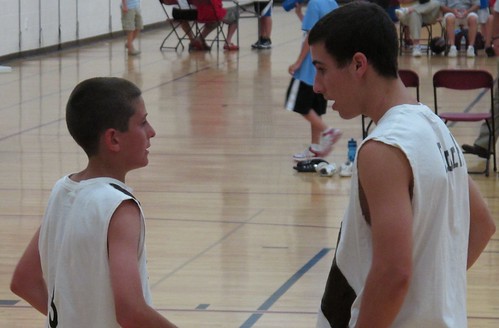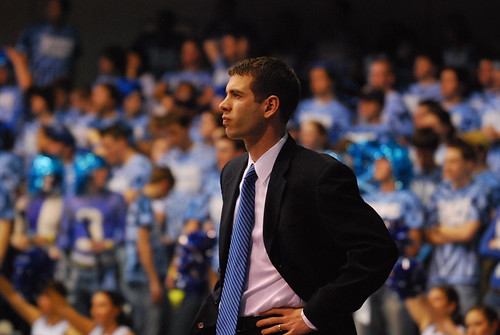By Marcus Shockley
This weekend, during one of the largest AAU basketball tournaments of the year, and one that also has the dubious distinction of being financed by a shoe company, the NCAA managed to make headlines with an old rule. That rule dictates that the NCAA will issue a secondary rules violation to any school that has a subscription to Rivals.com, due to the stated reason that Rivals “provides video of nonscholastic competition that is not available to the general public”.
This rule isn’t actually new, and the reports that the NCAA was singling out Rivals.com turned out to be inaccurate, in that the rule is intended to be a ban on any business that provides video of “nonscholastic competition” behind a paywall. You can read the original emails discussing the subject for yourself. It goes further to state that the fact that this video content is available behind a paywall isn’t even the real meat of the rule, but any video that is only available to a select group of people. In other words, any video that isn’t publicly available from any event other than a high school game is not to be accessed by coaches.
It’s hard to know where to start on how silly and completely unenforceable this is, and I really wonder if the NCAA actually has a legal team or if someone is just winging it. I see this as a completely indefensible policy, and since I always say if you are going to make a criticism, you should back it up, I’ll delve into how, exactly, the NCAA has really stepped in it with this attempt to enforce the rule.
Of course, I’ll start by saying I’m not an attorney, but that should make the possibility that NCAA hasn’t considered this fully, or perhaps doesn’t care, all the more cause for eye-rolling. I may not be giving legal advice and only offering my opinion on this page, but you don’t need to be a practicing attorney to extrapolate a rule to it’s possible conclusion. I’m completely in my freedom-of-speech rights when I say that I don’t believe the NCAA policy is well implemented.
Let’s start with the fact that secondary violations are not the type of stuff that grabs headlines and sends boosters into a panic. Secondary violations occur all of the time, and are usually self-reported. In layman’s terms, secondary violations are about as scary to college coaches as, say, a sleeping kitten. In fact, it’s been reported that most colleges report hundreds of secondary violations every year. Rest assured that if any college is using one of the services listed by the NCAA, they all will, because there’s no way a secondary violation is going to stand in the way while schools are getting an advantage. But there are much deeper problems with this rule, and they really hammer home the point that the NCAA is starting to look less like an organization that is in complete control and more like an organization whose compliance directives are being run by unclear objectives.
Let’s unpack this little gem a little further.
The rumor mill surrounding the NCAA’s rule is in relation to the recruiting services that aren’t really recruiting services at all, but a money laundering system that allows certain individuals to get paid significant sums of cash in order to deliver a recruit to a certain school. This is on the heels of the story of Willie Lyles, who was paid a reported $25K by Oregon for his “recruiting service”, but was more likely being paid to bring a few high profile football recruits into the Oregon fold.
The NCAA may be trying to get a handle on what it defines as a recruiting service, but if this is the first effort, it’s hardly a very effective way to start segmentation. It’s hard to make the correlation between a handler like Lyles getting paid and a service like ESPN, Rivals or Scout that is available to the general public. The wording of this rule tries to make a case that no video should be made available to coaches, either paid or unpaid, that is not available to the general public when it comes to nonscholastic competition. That would only apply to Lyles if his service was providing ecxlusive video of the recruits he was scouting to the colleges, not for delivering athletes. I cannot say whether the NCAA is really trying to use this rule to crack down on the Lyles of the world or not; however, in this case, there is so little connection between what Lyles was allegedly doing and paying for a Rivals subscription, it is hard to imagine that it would hold up under any legal scrutiny.
It would be far more likely that the NCAA would be trying to crack down on the tournaments, such as the EYBL last weekend, which occur under a system that is completely outside of their control. However, it is hard for the NCAA to make a case that all video of these events should be made available free to the public; they have no rights over the video in question, and have no authority to dictate how it is made available. There’s no legal footing for the NCAA to tell anyone what they can do with video footage that they own, so the best they can hope for is to try and stop the coaches from buying it.
However, video content from any sporting event is still, at it’s core, owned content, no different in effect than the written word. That means that anyone who has a legitimate scouting or recruiting service would also be subject to this rule for nonscholastic events. Which, may be what the NCAA really wants. They want to control who can go to the events outside of their ‘live periods’ and report on it to the coaches for a fee, or even for free if it’s not available to the public. I’m not sure if the NCAA understands that their rule might be designed to target video sites, but effectively includes all recruiting sites. I know that some people have speculated that articles and rankings on sites such as Rivals are fine for coaches to pay for, but I know I wouldn’t want there to be a legal challenge to test it.
But that’s where, in my opinion, the NCAA makes it’s biggest mistake. Not only are they attempting to overstep their bounds and dictate usage terms on content that they do not own the rights to, they are, apparently unwittingly, putting their own biggest partners on the line as well. The very wording in the rule would extend to any event that was available to a select group of people and not to the general public. Putting aside the written word of reputable recruiting services, major networks which cover various prep events are, in effect, subscription based.
To put it as simply as possible, not everyone has cable television. It is a paid service.
The reality is that some cable providers do not even carry all channels. That means that some coaches in the country have access to ESPN3, while others do not. That means that while many people have ESPN on their television package, it is not, technically, available to everyone. It is paywalled.
Dime magazine, Bounce magazine, SLAM magazine, Sports Illustrated? If you can’t get the latest copy without paying for it in some way, that’s also a paywall. Dime mag is available for free online, but you have to pay for internet service to access it. That is a paywall, and no matter what is only available to a select group of individuals.
That means that any video offered by those cable services, such as the McDonald’s All American game or the Jordan Brand Classic I’ll be at next weekend are nonscholastic and watching them would be an NCAA secondary violation.
I know that the NCAA is not going to have coaches report secondary violations for paying for a cable subscription, so immediately they lose any legal footing to claim consistency, even if they had any to start with. It’s possible that the NCAA could claim that some events are ‘sanctioned’ events, but again, would this hold up if faced with a legal challenge?
But, wait, it gets better.
There are not only recruiting services, showcases, cable broadcasts and mixtapes that the NCAA is attempting to control. There’s two other areas, such as video sent by recruits or their parents to prospective coaches, and the recruiting services that are hired by parents to help promote their child. Both of these scenarios would be at odds with the NCAA rule if the video contains nonscholastic competition. Many times part of a recruiting video will contain footage of the player shooting jump shots while someone is feeding him the ball, or dunking, and that is technically, not scholastic competition. So if a parent sends a video DVD to a coach with some of that type of footage, by the NCAA wording, that would seem to also be a violation. If the parent sends video of any showcase or AAU game, that would be a violation, because none of this video we’re discussing would be available to the public.
In the end, none of this matters, because the NCAA rule is effectively meaningless. It appears that the only consistency is that they are attempting to force an entire system into only putting money into their coffers, but the system they want, which might work out wonderfully for them but hurts players, parents, coaches and teams, has create an environment where the people involved at the grass roots level have evolved a way around them. As it stands now, the NCAA’s inability to address the real problem of corporate sponsorship for promising athletes and the money that is available to certain individuals willing to skirt the system has created a hybrid system that no longer needs the scholastic system and is just a hair’s breadth away from no longer needing the collegiate system.
I would pose the question, does the NCAA get paid for the video rights to the Final Four? That is an event that has value due to the amateur athletes involved, and the NCAA is charging for access. That television broadcast is not, technically, free. Nothing is free when money changes hands, and in the case of the Final Four, money certainly is paid to the NCAA. How is this any different than if Rivals posts live streaming of an All-Star game and charges for access? It’s the same concept to me. The NCAA does not make the Final Four available for free; in order to do that, they would not sell the rights; there would be no advertising sold for the event. The NCAA might try to claim that the broadcast is on network television and is therefore free to the public; but that is a shell game that claims somehow money paid from advertisers is different than money paid by viewers. It’s all paid content, meaning, someone paid for the video, and it doesn’t make a difference if that payment was made by a corporation or by thousands of viewers.
This latest attempt to create some kind of rule around Rivals, Scout and 247Sports just proves how nonsensical the NCAA’s approach is. Under no circumstances could I see construe this rule to be an attempt to protect the amateur status of the players involved.
****
Hey, if you like this kind of basketball coverage, do yourself a favor and sign up for the BasketballElite.com newsletter, which is free for basketball lovers.



